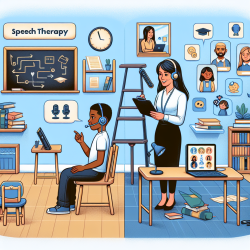Empathy and Emotion Recognition: Unlocking Potential in Children with Autism
In the realm of autism spectrum conditions (ASC), understanding the nuances of empathy and emotion recognition can significantly impact therapeutic outcomes. The research article "Do Adults with High Functioning Autism or Asperger Syndrome Differ in Empathy and Emotion Recognition?" provides insightful findings that can guide practitioners in tailoring interventions for children with ASC.
Understanding the Research
The study explored differences in empathy and emotion recognition between adults with High Functioning Autism (HFA) and Asperger Syndrome (AS). Using the Empathy Quotient (EQ) and the 'Reading the Mind in the Eyes' Test, the research found no significant difference in self-reported empathy between the groups. However, adults with AS performed better in recognizing complex emotions from eye expressions than those with HFA.
Implications for Practitioners
These findings highlight the importance of addressing specific challenges in emotion recognition for children with HFA. Practitioners can implement targeted strategies to support the development of these skills, which are crucial for social interactions and overall quality of life.
- Individualized Therapy: Tailor interventions to address the unique needs of each child, focusing on enhancing emotion recognition skills.
- Use of Visual Aids: Incorporate visual aids and social stories to help children understand and interpret emotions effectively.
- Role-Playing Activities: Engage children in role-playing scenarios to practice recognizing and responding to different emotions.
- Parental Involvement: Educate parents on strategies to reinforce these skills at home, creating a supportive environment for their child’s development.
Encouraging Further Research
The study raises questions about the existence of subgroups within autism spectrum conditions and their implications for therapy. Practitioners are encouraged to engage in further research to explore these differences and refine therapeutic approaches. Understanding the distinct needs of children with HFA and AS can lead to more effective interventions and improved outcomes.
For practitioners interested in delving deeper into the research, the original paper offers a comprehensive analysis of the findings. Do Adults with High Functioning Autism or Asperger Syndrome Differ in Empathy and Emotion Recognition?
Conclusion
By embracing the insights from this research, practitioners can enhance their skills and create meaningful change in the lives of children with autism. Through data-driven approaches and a commitment to understanding individual differences, we can unlock the potential within each child, fostering their growth and development.










